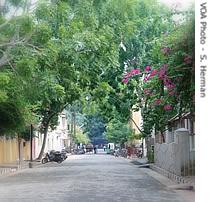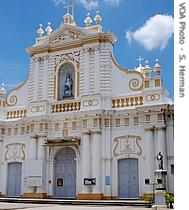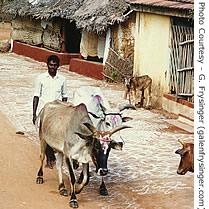2007年VOA标准英语-India's 'French Riviera' Clings to Gallic Cultu(在线收听)
Pondicherry, India
03 September 2007
India has been celebrating the 60th anniversary of its independence from the British Raj. But the British were not the only colonizers on the subcontinent in the mid-20th century. While the Union Jack was lowered for the last time in 1947, other nations hung on. The Portuguese clung to their colony in Goa until ousted by Indian troops in 1961. In 1954, the French quit their sleepy Indian seaside enclave of Pondicherry in southern India. VOA's Steve Herman traveled to what is now the Union Territory of Pondicherry to see what remains of the French legacy there.
On a quiet, shady street a few blocks from the Bay of Bengal, a three-wheeled auto taxi sputters past the decaying facades of French-built structures. The driver presses the bulb of his exterior-mounted horn to warn the few pedestrians ambling along the Rue de la Caserne.

Quiet venue in Pondicherry
This beachside community has been infused by Indian speech, dress and food since the French agreed to abandon their last territories in India in 1954. But the French atmosphere lingers, among the colonial-era mansions, churches, boulevards and promenades.
Prabhakar Vaidyanathan epitomizes the modern Pondicherry. His family chose Indian nationality over French after nearly 300 years of French colonial rule.
"We had a choice, but we refused to become French. But I still studied French. I have a lot of French friends. What remains of the French here now is a little of the culture that we've shared with them, they've shared with us, the way we eat, the way we speak," he said. "Even our Tamil [language] is different than the Tamil in Tamil Nadu."
 |
| Pondicherry cathedral |
France has a consulate here and various French entities help to maintain the cultural influence, including secondary schools, an Alliance Francaise (which runs the Le Club restaurant), the Institut Français de Pondichéry and the hangout of the now elderly men who fought in France's wars, the Foyer du Soldat.
While an estimated 20,000 Pondicherrians have moved to France, about 10,000 French reside here.
Alain Golivet is an abstract artist who came to Pondicherry from France five years ago. Sitting at the bar of a seaside hotel and sipping a cognac, Golivet says he does not spend much time waxing nostalgic about the faded French influence.
Golivet says he sees Pondicherry as a small town in a big country, a nice place for old guys to hang out with their French-speaking friends in the former administrative capital of Indian France.
Despite the émigrés from France, Golivet does not expect the new blood will restore Pondicherry's Gallic vigor.
The artist predicts that a half-century from now, the only remnants of France in Pondicherry will be basically what is here now - the architecture in the French Quarter.
That does not seem to cause angst among the locals. After all, the French, Dutch, English and Portuguese fought for centuries for domination of this patch of coast, and all have faded from memory with little consequence.
 |
| Street scene in Pondicherry |
The current territorial government has officially renamed the enclave Puducheri, although few people anywhere use the name. It plans to build a deep-water port for international trade and tourism.
Two thousands years ago, a port existed just south of the town where Roman goods, including wine, were imported. Those gathered in the bar of the Hotel Promenade say they will drink to that.